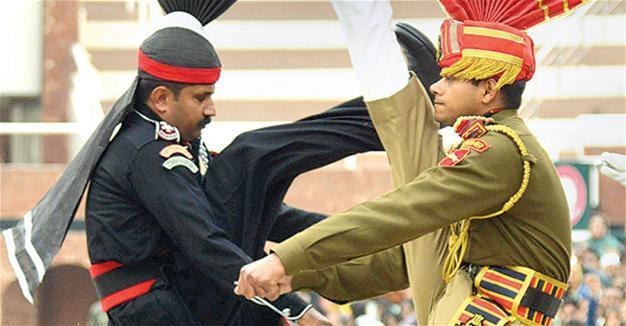As India marks 70 years of partition, memories fresh of border bloodshed
AMRITSAR – Reuters

India’s independence from British colonial rule coincided with the partition of the subcontinent into two separate countries, setting off unprecedented communal carnage on both sides of the hastily created border.
A mass migration followed, marred by violence and bloodshed, as about 15 million Muslims, Hindus and Sikhs, fearing discrimination, swapped countries in an upheaval that cost more than a million lives.
During the chaotic transition, train cars full of bodies arrived at railway stations in the twin cities of Lahore and Amritsar in the province of Punjab, which was split roughly down the middle at partition on Aug. 14, 1947.
As India prepares to mark 70 years of independence on Aug. 15, families who witnessed the death and destruction during partition recalled the tales of horror.
Brothers Santa and Niranjan Singh were lucky to survive the crossing from their village of Bhasin on the Pakistani side of the new border to their current home in Sarangra in India.
Santa, then aged 15 or 16, says everyone was baying for blood. People were running around with knives, swords and guns.
Up to a dozen people from their village were killed in the madness, Santa recalls, saying they carried an injured brother across the border after he was shot through the head.
“The bullet went in from one side and went out from the other side of his head,” said Santa, reminiscing at a gathering of his extended family. “We carried him all the way and he died after reaching this side.”
His younger brother, Niranjan, was barely 5 years old but still remembers the sight of houses being burnt and people being massacred and hearing stories of women and girls being raped.
Now the brothers live with their children and grandchildren, tending their lush green farmland located just three kilometres from the troubled border.
The separation based on border lines created by the British at the end of their colonial rule came into effect at the stroke of midnight on the eve of Aug. 14, 1947.
India and Pakistan have fought three wars since 1947, and relations remain tense, particularly when it comes to the disputed Himalayan region of Kashmir, which both claim in full but rule in parts.
Even as the rawness of the carnage that marked partition fades into history, the nuclear-armed neighbors re-enact their hostilities in ritual form in a colorful flag ceremony staged as the sun is setting over the Wagah border post that lies midway between Amritsar and Lahore.
Thousands of supporters from each country come to witness a parade of patriotism from their border guards who, in a mock confrontation, goose-step up to each other, stomp their feet and shout their lungs out during their daily retreat.
“Amazing, amazing feeling about my country, about my army,” said Phalguni Zaveri, who came from Mumbai with her husband Rahul to witness the parade.
“I am so happy and obliged for making us feel safe.”
 India’s independence from British colonial rule coincided with the partition of the subcontinent into two separate countries, setting off unprecedented communal carnage on both sides of the hastily created border.
India’s independence from British colonial rule coincided with the partition of the subcontinent into two separate countries, setting off unprecedented communal carnage on both sides of the hastily created border.